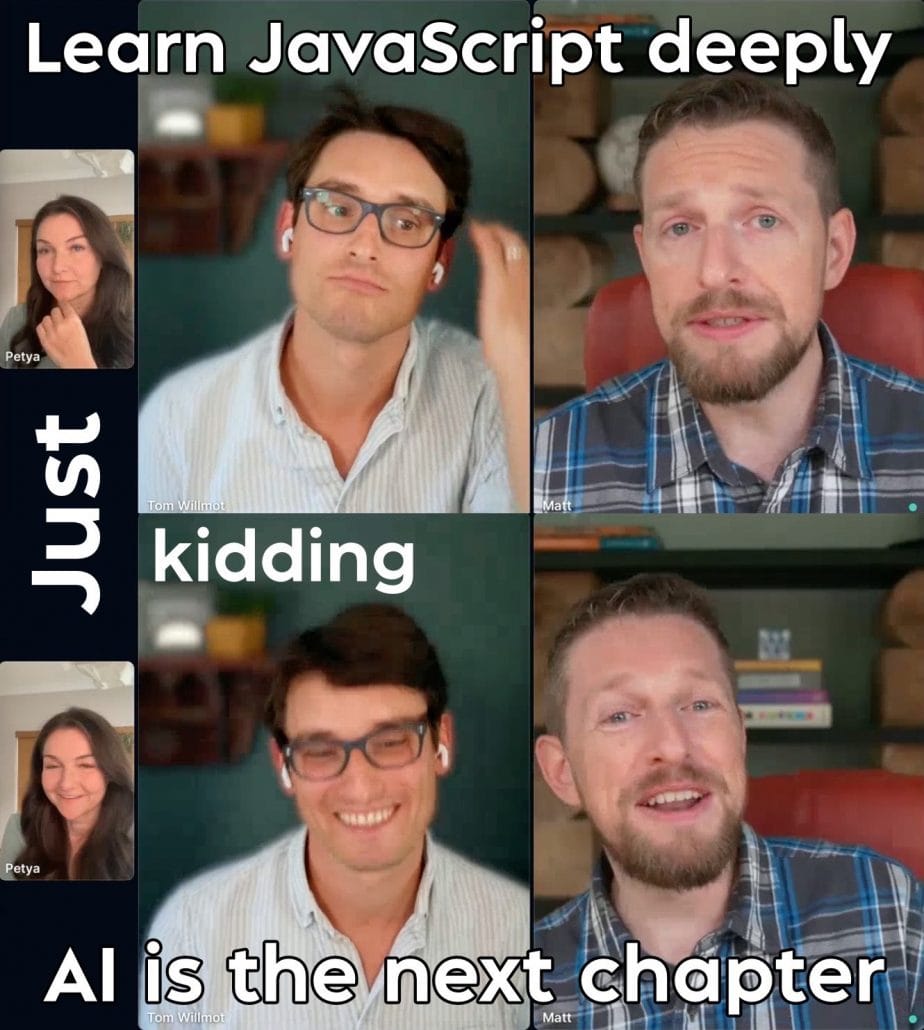After only 4 months, the second edition of the Word on the Future online event took place last week on September 14, AI: The next chapter. The event was kicked off by Humanmade’s Petya Raykovska and Tom Willmott, along with WordPress co-founder Matt Mullenweg.
The event focused on artificial intelligence, WordPress, and the latest innovations in the field. Petya recalled the success of the previous event in May and mentioned that they’ve incorporated feedback to enhance the current event. The agenda included discussions on WordPress, ethical challenges, AI in enterprise, modern SEO, and practical AI applications in WordPress. Petya emphasized the interactive nature of the event and encouraged attendees to participate.
Tom then welcomed Matt Mullenweg who shared the history of WordPress, its evolution from a blogging platform to a dominant CMS, and the foundation of Automattic. He also mentioned a unique conversation he had with Mike Little and the founder of Drupal, which we also covered in our blog.
The Importance of Open Source
Matt discussed his journey in the tech world, emphasizing the importance of open source. He recalled his early days in San Francisco, meeting influential figures in the tech industry, and founding Automattic. Over the years, Automattic expanded its services, including acquiring the microblogging and social networking platform Tumblr, which has over half a billion accounts. Matt emphasized the company’s commitment to making everything open source, ensuring customer-centricity, and maintaining data privacy. Tom acknowledged the significance of Automattic’s acquisition of Tumblr and its potential impact on WordPress. He also noted the challenges San Francisco has faced as a city, but recognized its resurgence as a tech hub.

Matt described Open Source as a fundamental human right. He believes in the freedom, liberty, and autonomy that open source offers, especially as our lives become increasingly mediated by technology. Matt stressed the need for people to have ownership of their technology stack, even if they never delve into the code. He sees the GPL (GNU General Public License), which WordPress uses, as a digital bill of rights.
Rapid Growth of AI Companies
Discussing the intersection of open source and AI, Matt noted the rapid advancements in open AI technologies. He mentioned the release of GPT-3 and Dolly as significant moments, and how other companies quickly caught up and even surpassed these innovations. He also touched on the rapid growth of AI companies, like imbue, and their quick rise to prominence. imbue aims to rekindle the dream of the personal computer by creating practical AI agents that can accomplish larger goals and safely work for us in the real world.
Tom and Matt discussed the rapid pace of innovation in open source, especially in the realm of AI. They noted how open source AI projects have moved at a surprising speed, challenging the notion that open source is slower than proprietary solutions. Matt believes that many in the AI community are idealistic, which drives them to share and collaborate. He draws parallels between the AI community’s desire for balance and the Manhattan Project, where scientists wanted to share nuclear knowledge to maintain a balance of power.
The conversation shifted to the evolution of GPT-4, with both noting that its performance seems to have declined. Matt theorized that OpenAI may be removing data from GPT-4 due to legal liabilities, as copyrighted content might have been used in its training. They discussed the challenges of managing data in AI models, especially with potential legal implications.
Learn AI Deeply
Matt emphasized the importance of open source in AI, particularly in the realm of code interpretation. He highlighted how AI models, like ChatGPT, have been trained on vast amounts of open source code, making them powerful tools for developers. He recalled his call to the WordPress community to «learn JavaScript deeply» and now urged to delve into AI, believing it to be the next significant trend. He envisioned AI tools scanning for security vulnerabilities, suggesting code improvements, and translating code between languages, underscoring the potential of AI in enhancing developer productivity.

AI for WordPress
Next, Tom and Matt delved into the potential of AI in the context of open source platforms, particularly WordPress. Tom expressed excitement about the AI platform shift, noting that previous technological shifts weren’t as open-source friendly. He wondered about the future of jobs in the WordPress ecosystem given the rapid advancements in AI and how the role of a CMS might evolve in an AI-dominated world.
Matt emphasized the democratizing power of technology, highlighting how WordPress has made it easier for individuals to create and customize websites without extensive technical knowledge. He envisions a future where AI can assist in website design, allowing users to make real-time changes based on verbal or written commands. He also touched on the potential for agencies and designers to present multiple mockups to clients in real-time, enhancing the design process.
The conversation shifted to the technical challenges of integrating open source AI models into platforms like WordPress. While current tools rely on APIs from companies like OpenAI, Matt sees potential in using open-source models, though he acknowledged the resource constraints of running these models on typical hosting accounts.
Tom raised the question of whether open-source models need to be paired with commercial operations to facilitate access. Matt believes that, for the foreseeable future, web services will be the primary mode of AI integration due to the computational demands of AI models. He envisions WordPress running AI-enhanced web services, such as sentiment analysis, plugin recommendations, and even a WordPress chatbot.
Tom then asked Matt for recommendations on resources to help people familiarize themselves with the AI landscape. Matt suggested watching the State of the Word address coming up in December 2023, following Simon Willison’s talk from WordCamp US, and engaging with AI-related content on Twitter. He emphasized the importance of staying updated with AI advancements for those in the tech field.
&tldr; – Conclusion
In their insightful discussion, Tom and Matt delved into the intersection of AI and open-source platforms, particularly focusing on WordPress. They highlighted the rapid pace of innovation in open-source AI projects, challenging the notion that proprietary systems innovate faster. The conversation also touched on the potential of AI to democratize and enhance various functionalities within WordPress, from content editing to site design. However, they acknowledged the challenges of integrating open-source AI models into commercial platforms. Both emphasized the importance of staying updated with AI advancements for anyone in the tech field, suggesting that AI’s integration is not just inevitable but essential for future growth and evolution.
Credits
- Picture Zurich Airport by Philipp Dubach
- YouTube Video of the summarized discussion betweet Tom and Matt
- AI for WordPress – recap of Joe Hoyle’s presentation at the first Word on the Future event




Schreibe einen Kommentar